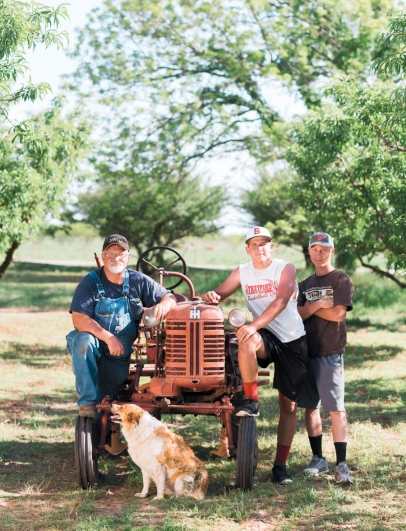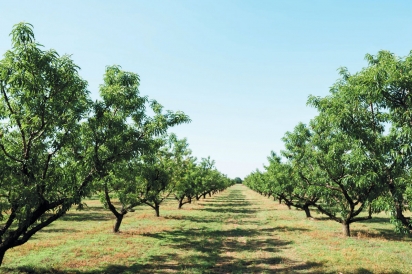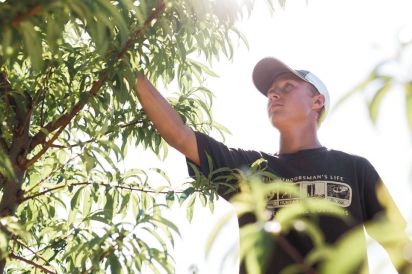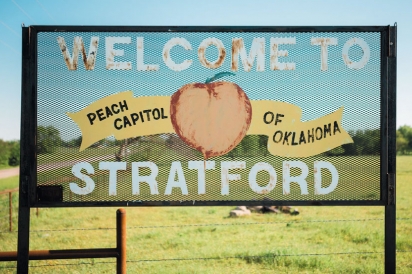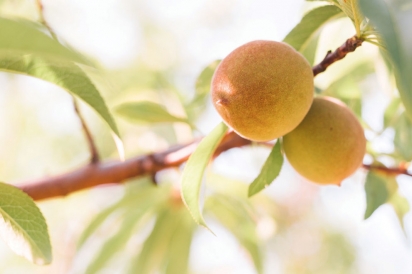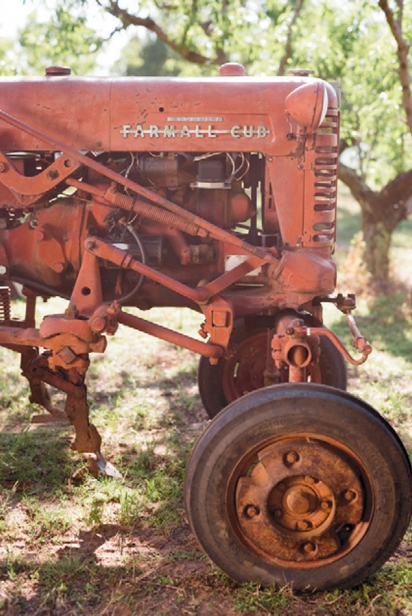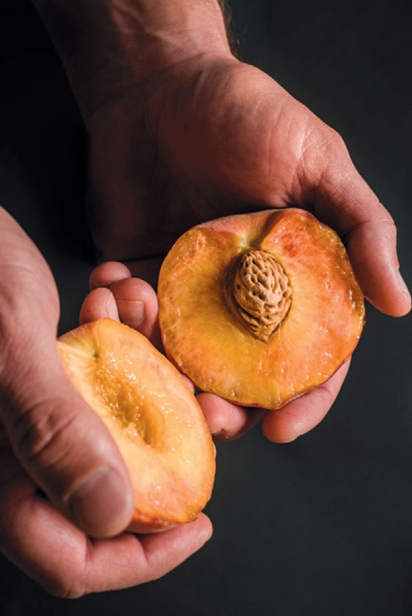Stratford Peaches
The clutch jerks into first gear, jolting the large trailer that serves as our seating. Craig says something, perhaps an apology for the sudden start, but his voice is lost underneath the ticking engine of his faded, cardinal red, 1948 Farmall Cub. The tractor’s engine takes a few go’s before the ignition sparks, but we then drive smoothly over the long grass that carpets Craig’s orchard. A round, short-legged red heelermix scampers happily alongside us.
It is late afternoon on a warm spring day in Byars, which is just northwest of Stratford. The sky is expansive in a way that only seems possible in rural Oklahoma. A few cottony cumulus sail away in the horizon under a breeze that is slow and even-tempered. Each gentle gust brings the scent of sweet manure, an odor which would ordinarily be nauseating to this tenderfoot, but is somehow comforting in our locale.
The first stop on this tractor tour of Pullen Peaches is a line of plum trees standing parallel to the road in front of the forty acres that comprise Craig’s farm and homestead. He stops the engine, and the quietude of the countryside seeps in. While not the focus of his farm, the plums and plumcots that Craig grows are still very popular. Jacob and Colton, the teenaged boys who help out on his farm, sit on the opposite side of the trailer, slightly bored by the mundanity of their after school job. They occasionally mutter inside jokes to each other, provoking wry smiles on their darkly suntanned faces.
After we sit for a moment and chat, Craig cranks the Cub’s engine and with another great heave, it sputters us towards Pullen’s main attraction: the peach grove.
“Do you believe in something called a ‘generational curse’?” Craig asks me while we stand in the shade between rows of his aging peach trees. Before receiving an answer, he begins to give an abbreviated family history that outlines his connection to farming.
His great-grandfather, George Washington Pullen, arrived in Indian Territory in 1898, a location that would eventually become Davis, OK. GW’s father was also a farmer, so he continued the lineage by growing wheat and raising cattle. He helped build the first church in Davis, and later went on to become a Murray county representative in the state legislature.
Farming has run in the Pullen family ever since, leading Craig to continue in those footsteps. In addition to the orchard, he has over 900 acres on which he raises mule and cattle. It takes about 20 hours a week to maintain the land and equipment, and he spends the rest of his time working as a mechanical contractor, repairing heat and AC.
“My wife always tells me, ‘Craig, don’t quit your day job!’” he says with a laugh. It’s a lot of extra work, but he finds peace driving around on his old tractor, listening to baseball games on a portable radio.
The majority of the labor with peach farming is thinning, or “cluster-busting,” as Craig calls it. The trees usually produce too much fruit, especially early in the season, so all the excess peaches are culled, enabling the ones that are left to grow to a larger size.
“When you’re thinning, the ground is just green with peaches,” says Jacob, the older of the two boys. At this early stage of the season, the fruit are small, green, and hard, resembling large nuts more than they do peaches. They generally reach their peak in July, and the season ends in August.
“When a peach is ready, a peach is ready,” Craig succinctly explains. This year has been not faring very well for the stone fruit. A mild winter caused many trees to bloom several weeks early, but then a late frost caused much of the fruit to be lost. Peaches can be a very difficult crop to grow. In fact, the Stratford peach could soon become a thing of the past, and it’s not just because of climate concerns.
Emerald leaves, thin and elliptical like
Spearheads, linked to spindly
Limbs, which sway slowly and bend In springtime’s lazy wind, they
Quietly rattle and collide, swish
Against their kin, obscuring
Early fruit, small and plain
Destined for oblivion
The red tractor makes a slow left turn out of a grove of old trees. Many of the 1,600 peach trees on Craig’s farm are fifteen years old. Their average lifespan is twelve years, so not much fruit is left for them to bear. Towards the east end of his acreage are a few rows of young trees, three years old, still too young to bloom. His own farm is aging away, which is a common situation around Stratford, a town which has dubbed itself “Peach Capital of the World.” Not only are the trees getting older, but many of the farmers are becoming too aged to keep up with them. At last year’s Stratford Peach Festival, most of the vendors were sold out by noon. Pullen has one of the few large peach farms left in Stratford, and it won’t be around forever.
Languid sun plump as
A plum dripping
Sweetness that washes
Over the trees drenching
Bared skin with warmth that
Dries out in the late evening &
Night is the knotted pit
The wooden core woven
Hidden from sight
Fleshless and parched
A stony truth, unswallowable
Yet part of the fruit
We pass large heaps of dry limbs and trunks, piles of dead trees. The boys explain that they spent the previous weeks cutting down much of the orchard that had succumbed to fungus, such as brown rot. When there is heavy rain in the spring, the trees are more susceptible to fungi that destroy limbs and cause the fruit to rapidly decay into a gummy, spore-covered mess. Some other produce farmers look forward to a rainy season, but for peach growers, it’s a headache.
“Peaches do not like wet feet,” Craig says, going on to explain how the rain, coupled with the clay soil that is abundant in the area, makes it difficult to maintain peach trees when the spring brings heavy rain.
The next threat to peaches is insects, especially grasshoppers. A few years ago, there was a plague of the creatures that nearly wiped out the year’s crops. One of Craig’s neighbors raised hundreds of guineas, which were effective in eating enough of the aggressive insects to help combat the problem. This was lucky because enough grasshoppers can wipe out a whole year’s haul.
It’s a lot of work to keep up with these orchards year after year, and many farmers are moving on from peaches to more profitable ventures, such as raising cattle. For the older generation, the physical labor required to climb up and down a ladder all day thinning fruit is simply overwhelming.
Aside from working afternoons at Pullen’s farm, Jacob and Colton have begun to lease another farm. The owner is elderly and suffers from a terrible case of Lyme disease that has disabled him from maintaining his orchard. At 17 and 15 years of age, these boys are learning important skills, not only in agriculture, but in running a business. It’s a small farm, and they’re not getting rich, but they should turn over a crop this season, providing them each with a little spending cash and money to save for college.
Jacob graduates from high school next year. He plays center for the Wayne Bulldogs basketball team, but isn’t looking towards sports for a career. He plans to use his share of the money the boys earn to pay for college tuition. Attending the agriculture program at OSU is his goal, one that will guide him towards a life of cultivating the land, hard days sweating under the sun, and hopefully, making a steady living for himself.
With a decline in population in many of Oklahoma’s rural communities, beloved local produce such as the Stratford peach could become a rarity. We have come to expect certain fruits and vegetables at the supermarkets and farmer’s markets. But without younger people like Colton and Jacob who are interested in growing our food, certain items will become scarcities on the shelf. The bite of a peach, the feeling of soft, fuzzy skin, and the sweet and juicy flesh could all one day be a faint memory.
Craig thinks about this often, and words it with blunt honesty: “If we let a generation of farmers die off, we’ll be in a bind for groceries.”


